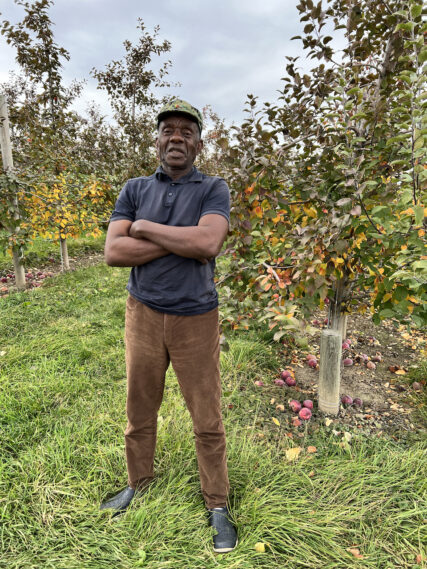Jamaican workers – a vital and welcome part of our community

Vivian Edwards
By John T Ryan
Peru – November 2, 2022 – The past few weeks have been apple harvest time in Peru, NY. Hundreds of Jamaican workers arrived in early September, and many will depart for home over the next several days. Vivian Edwards (age 68) is one of those workers. He’s been coming to Forrence Orchards for the past ten years. Before that, he picked apples for six years in the Hudson Valley and Winchester, VA, for nine years.
When Edwards leaves Peru this week, he’ll travel almost 2,000 miles to his home in Hagley Gap, St. Thomas Parish, Jamaica, about ten miles from Jamaica’s capital Kingston. Like Forrences, Edwards is also tied to agriculture, but his crops are very different from apples. Instead, Edwards grows coffee, bananas, plantain, and sugar cane on his two to three-acre farm. Hagley Gap, located at about 7,400 feet above sea level in Jamaica’s Blue Mountains, has the ideal climate to grow one of the world’s most expensive coffees. Edwards said, “We grow the best coffee in the world in Jamaica.” Edwards’ wife Nora and his brother tend the farm when Edwards is away picking apples. He commented, “Not being home to look after my farm is the most difficult thing about being here.”
Nevertheless, Edwards enjoys his time in Peru. While he and his fellow Jamaicans work hard, they have few complaints. Many men, like Edwards, are farmers; hence, they know the meaning of a day’s work. But, Edwards stressed, “I like to work. Nobody who sits down expects to get money. We need to work to put bread on the table.” Asked how the Jamaicans deal with a man who isn’t working hard, Edwards said that doesn’t often happen, “We encourage each other. We work as a team.”
Early in the harvest season, picking begins at 7 a.m. Then, at about 11 a.m., warm meals arrive in the orchard. Rice and chicken are Jamaican staples, but beef and fish are also on the menu. Breakfast is hearty, featuring fried eggs, bacon, sausage, coffee, and tea. Forrences employ five chefs who prepare three Jamaican-style meals daily for the 174 men. The men pay $14 daily for the meals.
The federal government regulates pay and living standards under its H2A program. This year the men earn $15.66 an hour, with no deductions, plus overtime at $23 an hour when their workweek exceeds six days. In addition, orchards pay transportation and housing costs. Edwards said his earnings here in Peru equal and sometimes exceed his yearly earnings in Jamaica.
Peru residents see Jamaican workers walking and biking throughout our community, especially to the Dollar Store, the St. Vincent’s shops, the bank, and Grand Union. They spend thousands of dollars in our community. Most will bring home gifts for their wives and families. For example, Edwards said, “I’m bringing clothing for my wife, soaps, and lotions. I’m also bringing sweets for the schoolchildren.”
Does he think a time will come when Jamaicans will no longer want to go to this country to pick apples? Edwards responded, “I don’t think so. I hope they keep coming. It’s a good experience.”
Editor’s Note – I acted on Mr. Edwards’s recommendation that I try Jamaican coffee. I bought a package at the Peru Grand Union and my wife and I love it! He also encouraged us to visit Jamaica to eat the food and enjoy the music. We’ll be looking into doing that too! He’s leaving Peru today to travel home. Have a safe trip, Mr. Edwards! It was a pleasure meeting you.
Posted: November 2nd, 2022 under Agricultural News, Business News, Faces of Peru, General News, Northern NY News, Peru News, Peru/Regional History.
